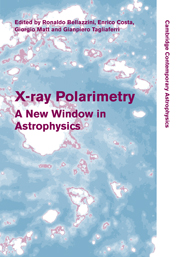Book contents
- Frontmatter
- Contents
- List of contributors
- Preface
- 1 X-ray polarimetry: historical remarks and other considerations
- Part I Polarimetry techniques
- 2 Scattering polarimetry in high-energy astronomy
- 3 Photoelectric polarimeters
- 4 Bragg crystal polarimeters
- 5 X-ray polarimetry with the photon-counting pixel detector Timepix
- 6 High-energy polarized photon interactions with matter: simulations with Geant4
- 7 The GPD as a polarimeter: theory and facts
- 8 Ideal gas electron multipliers (GEMs) for X-ray polarimeters
- 9 Broad-band soft X-ray polarimetry
- 10 Feasibility of X-ray photoelectric polarimeters with large field of view
- 11 Angular resolution of a photoelectric polarimeter
- 12 Development of a Thomson X-ray polarimeter
- 13 Hard X-ray / soft gamma-ray polarimetry using a Laue lens
- Part II Polarized emission in X-ray sources
- Part III Future missions
- Author index
- Subject index
6 - High-energy polarized photon interactions with matter: simulations with Geant4
from Part I - Polarimetry techniques
Published online by Cambridge University Press: 06 July 2010
- Frontmatter
- Contents
- List of contributors
- Preface
- 1 X-ray polarimetry: historical remarks and other considerations
- Part I Polarimetry techniques
- 2 Scattering polarimetry in high-energy astronomy
- 3 Photoelectric polarimeters
- 4 Bragg crystal polarimeters
- 5 X-ray polarimetry with the photon-counting pixel detector Timepix
- 6 High-energy polarized photon interactions with matter: simulations with Geant4
- 7 The GPD as a polarimeter: theory and facts
- 8 Ideal gas electron multipliers (GEMs) for X-ray polarimeters
- 9 Broad-band soft X-ray polarimetry
- 10 Feasibility of X-ray photoelectric polarimeters with large field of view
- 11 Angular resolution of a photoelectric polarimeter
- 12 Development of a Thomson X-ray polarimeter
- 13 Hard X-ray / soft gamma-ray polarimetry using a Laue lens
- Part II Polarized emission in X-ray sources
- Part III Future missions
- Author index
- Subject index
Summary
A detailed simulation of the interactions of polarized photons is required to design new gamma-ray telescopes. Two new classes have been designed and implemented to describe the interactions of polarized photons in the pair-production regime.
Introduction
A detailed simulation of the geometry and of the involved physics processes is required from the very early stages of a new instrument development. Indeed both the development and the optimization of new-instrument concepts, performed with detailed comparisons between different configurations, as well as the detailed characterization of instrument responses and the verification of the scientific objectives of a new instrument, require the same detailed simulation.
Geant4 is an object-oriented toolkit for the simulation of high-energy physics detectors that is now widely used in nuclear physics, medical physics, astrophysics, space applications, radiation background studies, etc. Geant4 is supported by a large international collaboration with the participation of various institutes around the world. It is also an experiment in the application of rigorous software engineering methodologies.
In particular the physics is open to the user, who has the possibility to select among different models of the same physics process or to extend existing models to cover new requirements.
Polarized photon interactions in Geant4
The Compton and Rayleigh processes are affected by the polarization of the incoming radiation, and even an unpolarized beam acquires a certain degree of polarization after a Compton or Rayleigh event. So a description of these processes in which the polarization is present is particularly relevant even though the incoming radiation is not polarized.
- Type
- Chapter
- Information
- X-ray PolarimetryA New Window in Astrophysics, pp. 48 - 53Publisher: Cambridge University PressPrint publication year: 2010



